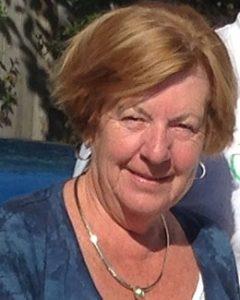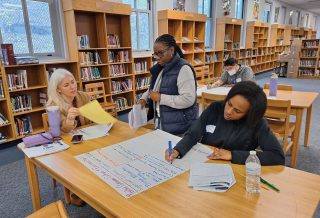FOCUS
The view from Canada
By Beate Planche, Audrey Hobbs-Johnson, and Carol Campbell
Categories: Collaboration, Fundamentals, Implementation, International perspectives, Learning communities, Reaching all students, Standards for Professional LearningJune 2022
As colleagues representing two Canadian provinces and with a long-standing association with Learning Forward as affiliate members, we share a distinctly Canadian lens on the launch of the revised Standards for Professional Learning.
First, a little context: In Canada, there is no federal department of education, nor is there a national system of education. Education is the responsibility of provinces and territories (which operate similarly to U.S. states), and provincial education ministries lead the organization, implementation, and assessment of education within their jurisdictions.
However, the Council of Ministers of Education, Canada, which is made up of ministers who represent the education interests of Canada’s 10 provinces and three territories, defines the Canadian priorities for elementary and secondary education. The council’s goal is to ensure that all students in our country can access learning opportunities that are inclusive and result in the acquisition of strong literacy, numeracy, and science skills (Council of Ministers of Education, Canada, 2008).
What this means for professional learning is that each province and territory establishes its particular agenda for professional learning based on provincial goals. As a result, Canada has a “mosaic of professional learning experiences, opportunities, promising practices, and challenges” that are differentiated to educators’ and students’ needs (Campbell et al., 2017, p. 73). In Canada, “there is no ‘one-size-fits-all’ approach to professional learning nor should there be” (Campbell et al., 2017, p. 73).
Another important piece of context is that we do not use the term standards in Canada. A 2017 study of professional learning in Canada uses the wording “key components and features of effective professional learning” instead of standards (Campbell et al., 2017, p. 8). Despite this difference in terminology, we concur that the research and foundations of the standards match our own understanding of the importance of high-quality, high-impact professional learning as one important tool for improving schools, empowering educators to meet students where they are, and serving them effectively.
Similarly, the term professional learning systems, which appears throughout Standards for Professional Learning, does not fit in our context because “systems” implies a centralized approach that is not applicable in Canada.
For example, although school boards across the province of Ontario take direction from the Ontario Ministry of Education regarding overall curricular and professional learning priorities, individual school boards decide how to integrate the provincial priorities with board- and school-specific priorities to chart a plan for continuous improvement and fuel professional learning in their jurisdiction.
Furthermore, individual teachers and administrators also chart their own growth plans. This localized approach to learning is why many individual Canadians are members of our provincial Learning Forward affiliates as well as Learning Forward itself.
Guiding professional growth
Although we use different terminology, we embrace the sentiments in Standards for Professional Learning. The standards align with our own thinking about high-quality professional learning elements. As Learning Forward affiliate leaders in Ontario and British Columbia, we can use them as guiding principles in our planning of professional supports for teachers and leaders aimed at local needs.
For example, in Ontario, a focus on equity issues is a provincial priority, and thus the revised standards align strongly in this area. During this past school year, we organized online network learning about anti-oppressive pedagogical approaches in literacy instruction and invited speakers to discuss how to develop more inclusive teaching approaches. We also organized a panel discussion on how destreaming secondary mathematics better supports learners. All of these efforts support more equitable outcomes in our settings.
In British Columbia, the latest standards align with ongoing efforts to build and sustain a professional learning culture, which is an active and collaborative process among all the professional organizations in the province as well as the Ministry of Education. A 2017 case study, The State of Educators’ Professional Learning in British Columbia, outlines some of these processes in the province. The case study describes effective professional learning as purposeful in its design, content, process, and application stages and strives to attain balance between personal, community, school district, and provincial priorities and needs (Brown et al., 2017).
Equity is a priority
If there is one area of professional growth that stands out above all to us in the revised Standards for Professional Learning, it is the emphasis on equity both as an outcome and a vital focus of professional learning. Reaching more equitable outcomes through valuing and promoting student identity is very much a priority for us in Canadian education.
Although our public schools have proven to be highly successful according to provincial and international assessments, improving equity outcomes stands out as a vital area for improvement and is therefore central in professional growth and learning. This work is guided, in part, by provincial policies and expectations and by directives from the national Truth and Reconciliation Commission of Canada.
The Truth and Reconciliation Commission of Canada was convened to redress the painful legacy of Canada’s residential schools for Aboriginal children that, for over 100 years, separated Indigenous children from their families and cultures and aimed to indoctrinate them in Euro-Christian Canadian society.
The final report of the commission articulated a commitment to a renewed nation-to-nation relationship with Indigenous peoples based on recognition of rights, respect, cooperation, and partnership. It outlined 94 specific calls to action, many of which address the roles of educators in clarifying history and language we have used and will use in our curriculum and learning processes (Truth and Reconciliation Commission of Canada, 2015).
As we work to help our affiliate members respond to those calls to action and cultivate equity in their schools, Standards for Professional Learning’s three equity-focused principles (and the whole framework’s emphasis on equity) align with and support our work. Learning Forward has defined equity as the outcome of educator practices that respect and nurture all aspects of student identity rather than treat them as barriers to learning (Learning Forward, 2022, p. 8).
In Ontario, we follow a similar definition. As a part of the provincial Equity and Inclusive Education Strategy 2009, equity was first defined as “a condition or state of fair, inclusive, and respectful treatment of all people” (Ontario Ministry of Education, 2009). That strategy went on to state: “Equity does not mean treating people the same without regard for individual differences.” In more recent strategy developments, a broader equity goal was introduced: “All children and students will be inspired to reach their full potential, with access to rich learning experiences that begin at birth and continue into adulthood” (Ontario Ministry of Education, 2014, p. 3).
To meet our broad equity goals in British Columbia and Ontario, we have specific goals for recognizing and supporting marginalized groups who historically have not had the same opportunities for success as their peers, including our Indigenous, LGBTQ, and two-spirit students. (Two-spirit is a modern, pan-Indian, umbrella term used by some Indigenous North Americans to describe Native people in their communities who fulfill a traditional third-gender ceremonial and social role in their cultures.)
For example, in British Columbia, the Equity in Action Project addresses the directions education partners are taking in a co-constructive approach to review practices and policies that may be creating obstacles for learners who come from a variety of cultures, races, and ethnic backgrounds.
Each district does an equity scan that then guides a collaborative decision-making process for school districts to enter into a self-assessment dialogue about the experience of education for Indigenous learners and respond in strategic ways to create conditions for success.
Equity as a driver in our work includes multiple facets. One, which reflects Standards for Professional Learning, is being sensitive to culturally responsive curricula. We also need to help teachers and administrators become attuned to their individual communities and set high standards for all stakeholders, as the standards specify. Another facet, which we would add to the standards, is putting student voice and agency at the center of our decision-making and planning regarding equity goals.
Collaborative professionalism
Standards, or key components, are also a starting point to building a culture of collaborative professionalism, which is central to the work of the Canadian Learning Forward affiliates. Collaborative professionalism, a term coined by Michael Fullan and Andy Hargreaves (2016), refers to a culture where professional expertise and knowledge are nurtured through purposeful, persistent inquiry, practice, reflective feedback, and commitment to continuous learning and improvement. This concept maps closely to the Culture of Collaborative Inquiry standard of Standards for Professional Learning.
As Carol Campbell (2021) highlighted, professional learning work in Ontario has shown that purposeful collaborations that meet the Culture of Collaborative Inquiry criteria have proven highly effective in terms of teacher and leader development to support improvement efforts.
For example, integrating with school board efforts to move professional learning forward from 2003 to 2013, ministry representatives worked with representatives from teacher unions to reform teacher development policies at partnership working tables.
From 2014 to 2018, the Ministry of Education in Ontario, working with education partners including teacher unions, fleshed out the concept of collaborative professionalism, which solidified our focus on a shared responsibility for educator growth. Collaborative professionalism took on intentional priorities for equity and well-being in Ontario (Ontario Ministry of Education, 2016).
The lesson of reform in Ontario is that genuine collaboration between and among education partners and stakeholders is needed to develop a robust and shared understanding of appropriate strategies and practices. Collaborative professionalism is vital to build a healthy workforce committed to equity goals through learning networks and communities.
Collaborative inquiry has also been a driving force for success in British Columbia. As one example, Changing Results for Young Readers was a collaborative inquiry project to increase the number of children who are engaged, successful readers.
Teachers in participating districts met with a facilitator each year to explore inquiry questions they chose. This included two provincial sessions per year where facilitators shared resources. This led to strong results, including increased literacy skills in 96% of vulnerable students (Brown et al., 2017, p. 56).
Learning is the work
Despite differing contexts, as Canadian affiliate members, we come to the table Learning Forward offers us as education partners and colleagues. Learning Forward’s revised Standards for Professional Learning have reminded us through their renewed and clear articulation that learning is the work.
The revised standards and supporting documents and processes can help us focus on effective collaboration, collaborative inquiry, and co-learning as educators lead learning for themselves and others. In our quest for researched evidence, the standards as a key research component can help educators continue to change the culture in schools, districts, and provinces to one that values well-researched high-quality professional learning.
Our collective work concerns harnessing our efforts and moving forward, especially as we refocus during a pandemic and in uncertain times (Planche & Erdmann, n.d.). We know that the work of improvement needs many hearts and minds working together. A partnership approach, working with Learning Forward as well as other provincial groups and organizations, is most authentic for us as Canadian affiliates.
Download pdf here.
References
Brown, S., Hales, A., Kuehn, L., & Steffensen, K. (2017). The state of educators’ professional learning in British Columbia. Learning Forward. learningforward.org/wp-content/uploads/2017/08/state-of-educators-british-columbia.pdf
Campbell, C., Osmond-Johnson, P., Faubert, B., Zeichner, K., & Hobbs-Johnson, A. (with Brown, S., DaCosta, P., Hales, A., Kuehn, L., Sohn, J., & Steffensen, K.). (2017). The state of educators’ professional learning in Canada: Final research report. Learning Forward.
Council of Ministers of Education, Canada. (2008). Learn Canada 2020: Joint declaration, provinicial and territorial ministers of education. Author.
Fullan, M. & Hargreaves, A. (2016). Call to action: Bringing the profession back in. Learning Forward.
Learning Forward. (2022). Standards for Professional Learning. Author.
Ontario Ministry of Education. (2009). Equity and inclusive education strategy. Author.
Ontario Ministry of Education. (2014). Achieving excellence: A renewed vision for education in Ontario. Author.
Ontario Ministry of Education. (2016). Policy/program memorandum 159. Author.
Planche, B. & Erdmann, R. (n.d.). Moving forward despite uncertainty: Leading schools during a pandemic. Canadian Association of Principals. cdnprincipals.com/moving-forward-despite-uncertainty-leading-schools-during-a-pandemic/
Truth and Reconciliation Commission of Canada. (2015). Truth and Reconciliation Commission of Canada: Calls to action. Author.
Categories: Collaboration, Fundamentals, Implementation, International perspectives, Learning communities, Reaching all students, Standards for Professional Learning
Recent Issues
LEARNING DESIGNS
February 2025
How we learn influences what we learn. This issue shares essential...
BUILDING BRIDGES
December 2024
Students benefit when educators bridge the continuum of professional...
CURRICULUM-BASED PROFESSIONAL LEARNING
October 2024
High-quality curriculum requires skilled educators to put it into...
LEARNING TO PIVOT
August 2024
Sometimes new information and situations call for major change. This issue...













